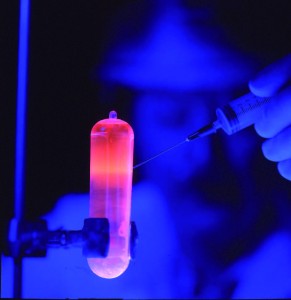WEDNESDAY, 15 MAY 2013
A century after Gregor Mendel proposed the idea of inheritance and nearly six decades since the structure of DNA was deduced, we have come to realise that many human diseases are linked directly to our genes. From infections to heart disease, scientists have revealed associations between many debilitating illnesses and the different versions of genes, known as alleles, that people carry. Understanding the genetic basis of disease has revolutionised the way we diagnose, monitor and treat illness, but it has also raised the question of whether the scientists who discovered these genes and their disease associations own their discovery, and to what extent should they be rewarded for their work.The idea of patenting human genes is one that has been the subject of much contention and controversy. Pharmaceutical companies, as well as many academic scientists, have carried out the majority of the research into the molecular basis of disease in the hope of generating a profit from their discoveries. Scientific research is an expensive business, and patenting can give labs financial security in promoting innovation and funding future projects. But, many scientists, medical professionals and non-profit organisations argue that it is unethical to charge a fee to those who seek to know if they carry a disease-causing allele, and that such information should be freely available to prevent unnecessary human suffering.
Gene patenting is once again in the spotlight as the United States Supreme Court is set to rule on a lawsuit that has dominated the debate on human gene patenting and decide whether the molecular diagnostic company Myriad Genetics can patent the BRCA1 and BRCA2 (Breast cancer type 1/2 susceptibility proteins) genes, giving them the sole right to perform diagnostic tests.
BRCA1 and BRCA2 were discovered and sequenced in the early nineties, from a woman with a strong family history of breast and ovarian cancer. Normally, BRCA proteins repair DNA when damage is detected. However, a small number of people have a form of the BRCA gene that is unable to reverse the DNA damage causing genetic material to accumulate within a cell leading to the development of cancer. Carrying an abnormal copy of either BRCA1 or BRCA2 increases the risk of breast and ovarian cancer development by up to 60 per cent. The discovery of the BRCA genes was a major scientific advance in genetics, enabling screening of high-risk women for susceptibility alleles and therefore allowing early medical intervention and ultimately saving many lives.
Myriad, a company founded by one of the scientists who initially discovered BRCA, was granted a patent in 1997 and holds the rights for detecting gene mutations to diagnose cancer, as well as using the genes to identify novel drugs directly targeting the BRCA proteins. The controversy surrounding gene patenting stems from the refusal of Myriad to licence its genes to labs wishing to use BRCAs for clinical testing. Although Myriad will allow other researchers to study the genes for free, it is the sole provider of BRCA1 and BRCA2 diagnostic testing in the US, allowing them to set a market price of around $3000 for a full analysis of the genes.
The company relies solely on the patents to generate its profit. However, its patent is due to run out in 2014, although they hope to extend it, as in the US a patent has a 20 year term from the filing date, but can be extended if it relates to a human or animal drug product. The American Civil Liberties Union (ACLU), a non-profit organisation that advocates individuals’ rights, together with the Public Patent Foundation (PUBPAT), has challenged whether the patent should stand and has brought a lawsuit against Myriad. The outcome of the judgement will determine the fate of genetic research and every one of us who may seek medical attention for diseases in the future.
In the US, like most other countries, patenting ‘natural law’ is not allowed. For example, the law of gravity can be observed anywhere in the world, and the usage of such law is not (and cannot possibly be) restricted by a simple patent. The patent for genes is a more complicated issue. Although patent law cannot protect natural phenomena, DNA historically has been regarded as a sequence of chemicals determined by humans, and therefore not seen to be natural. This is because as recently as the 1990s, to sequence just one gene was considered a mammoth task. The first complete human genome sequence was published in 2003 at a cost of billions of dollars and joint effort across the globe. As protection for their effort and financial investment, many companies and academics filed patents for the genes they discovered, so they could secure the financial benefits the genes might bring. This was the case for Myriad, who beat their European competitors to patent the BRCA genes and as a result enjoyed great success through the sale of diagnostic tests.
Biotech companies argue that having the patents does not just reward their hard work but also allows their labs to focus solely on mutations that might occur in the patented genes. Myriad suggested that their company studied the mutations more thoroughly before publishing them, in comparison with other laboratories that simply reported the mutation without showing how it causes cancer. They claimed that the company had invested in building their facility to constantly improve and maintain the quality of their testing kit. Furthermore, most biotech companies only pursue litigation for those who seek to profit, not the majority of scientists who work on the general studies of the genes.
The ACLU, however, argued that the patents have slowed the progress of understanding BRCA mutations. Although there are currently 8000 publications on the genes, according to the journal Nature, Myriad had prevented at least five researchers from testing women directly following the studies. Moreover, a study carried out by Professor Mary-Claire King of the University of Washington, whose group was involved in the initial studies of the BRCA genes’ linkage with cancer, suggested that Myriad’s test kit, ‘Comprehensive BRCAnalysis’, did not pick up a number of mutations that are significant in the development of cancer. Additionally, Myriad’s figures show that the company made $402 million in revenue, of which 90 per cent was directly from the test kit, in the fiscal year ending June 2011. ACLU argued that Myriad has already been rewarded financially for the discovery of the BRCA genes. If the restriction imposed by the patent had been lifted, progress in the understanding of how different BRCAalleles lead to cancer could have improved significantly.
Critics of Myriad believe that patients are losing out as a result of the patent. For many people in Europe, health care is provided freely. More importantly, the BRCA patents in Europe are held by Cancer Research UK, a charity, which offers a different diagnostic kit than that from Myriad and free licensing to “any reputable laboratory that wants to use it”. For US citizens, however, the expensive price tag will have prevented many from accessing the test for BRCA alleles and any early disease intervention. More worryingly, Myriad’s own testing has suggested that for Latino women, an entire 20 per cent of all mutations can only be detected by its supplementary test, costing an additional $700 and not covered by many insurers in the US.
Since 2009, the journal Nature has been following the progress of the lawsuit between Myriad and ACLU. In March 2012, the federal court ruled in Myriad’s favour. The Supreme Court then requested the court to reconsider, but in August the court ruled in Myriad’s favour once more. Since then, ACLU and the PUBPAT have asked the Supreme Court to reconsider certain aspects of the case. On 30th November 2012, the court decided to answer the question of whether the human genes are patentable. The ruling is expected later this year. Whatever the decision, the Supreme Court will not just be deciding on the fate of one biotech company, it will be deciding on the future of gene patenting, and the implication it has for patients around the world and the scientific community as a whole.
Chin-Chin Chen is a 2nd year PhD student at the Department of Medicine



